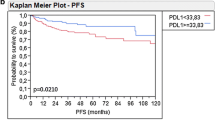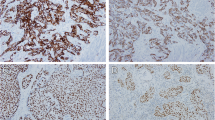Abstract
To investigate the potential prognostic role of NFκB expression in primary high-grade non-muscle-invasive bladder cancer. Patients with primary high-grade non-muscle-invasive bladder cancer who received induction and maintenance BCG therapy were retrospectively included. Recurrence and progression were histologically proven. Intensity and extent of immunochemistry were assessed. The final evaluation of the NFκB staining was done by combining intensity and extent as ΄΄product΄΄ and expressing it as ΄΄low NFκΒ expression΄΄ or ΄΄high NFκB expression΄΄. Epidemiological, pathological, clinical parameters and NFκB expression were statistically analyzed for recurrence (REC), progression (PR), recurrence-free survival (RFS) and progression-free survival (PFS). NFκB is significantly associated with disease progression (p < 0,001 in univariate analysis and p = 0,001, Odds Ratio = 14,484, 95% Confidence Interval = 3187-65,821 in multivariate analysis), but not with recurrence. The median value of NFκB expression as ΄΄product΄΄ is significantly higher for the patients with progression in comparison to patients with recurrence only (p = 0,003) and patients without recurrence or progression (p = 0,001). Patients’ age is significantly associated (p = 0,001 in univariate analysis and p = 0,003, Odds Ratio = 1273, 95% Confidence Interval = 1086–1492 in multivariate analysis) with disease recurrence. High NFκB expression in primary high-grade non-muscle-invasive bladder cancer, treated with postoperative intravesical BCG immunotherapy, could represent an unfavorable prognostic factor.




Similar content being viewed by others
References
Babjuk M, Böhle A, Burger M, Capoun O, Cohen D, Compérat EM et al (2016) EAU Guidelines on Non-Muscle-invasive Urothelial Carcinoma of the Bladder: Update 2016. Eur Urol. https://doi.org/10.1016/j.eururo.2016.05.041
Sylvester RJ, Brausi MA, Kirkels WJ, Hoeltl W, Calais Da Silva F, Powell PH et al (2010) Long-term efficacy results of EORTC Genito-Urinary Group randomized phase 3 study 30911 comparing intravesical instillations of epirubicin, bacillus Calmette-Guérin, and bacillus Calmette-Guérin plus isoniazid in patients with intermediate- and high-risk stage Ta T1 urothelial carcinoma of the bladder. Eur Urol 57(5):766–773
Soloway M, Khoury S (2012) Bladder cancer. 2nd edition 2012: ICUD-EAU; 254, 261. EDITIONS 21, Paris, France
Lee CT, Dunn RL, Ingold C, Montie JE, Wood DP Jr (2007) Early-stage bladder cancer surveillance does not improve survival if high-risk patients are permitted to progress to muscle invasion. Urology 69(6):1068–1072
Herr HW, Sogani PC (2001) Does early cystectomy improve the survival of patients with high risk superficial bladder tumors? J Urol 166(4):1296–1299
Zachos I, Konstantinopoulos PA, Vandoros GP, Karamouzis MV, Papatsoris AG, Podimatas T et al (2009) Predictive value of telomerase reverse transcriptase expression in patients with high risk superficial bladder cancer treated with adjuvant BCG immunotherapy. J Cancer Res Clin Oncol 135(9):1169–1175
Saint F, Salomon L, Quintela R, Cicco A, Hoznek A, Abbou CC et al (2003) Do prognostic parameters of remission versus relapse after bacillus Calmette-Guérin (BCG) immunotherapy exist? Analysis of a quarter century of literature. Eur Urol 43(4):351–360
Ghosh S, May M, Kopp EB (1998) NFκB and Rel proteins: evolutionary conserved mediators of immune responses. Annu Rev Immunol 16:225–260
Levidou G, Saetta AA, Korkolopoulou P, Papanastasiou P, Gioti K, Pavlopoulos P et al (2008) Clinical significance of nuclear factor (NF)-Κb levels in urothelial carcinoma of the urinary bladder. Virchows Arch 452(3):295–304
Kang S, Kim YB, Kim MH, Yoon KS, Kim JW, Park NH et al (2005) Polymorphism in the nuclear factor kappa-B binding promoter region of cyclooxygenase-2 is associated with an increased risk of bladder cancer. J Can Let 217(1):11–16
Pahl HL (1999) Activators and target genes of Rel/NF-kappaB transcription factors. Oncogene 18(49):6853–6866
Lamm DL, Blumenstein BA, Crissman JD, Montie JE, Gottesman JE, Lowe BA et al (2000) Maintenance bacillus Calmette-Guérin immunotherapy for recurrent TA, T1 and carcinoma in situ transitional cell carcinoma of the bladder: a randomized Southwest Oncology Group Study. J Urol 163(4):1124–1129
Shukla S, MacLennan GT, Fu P, Patel J, Marengo SR, Resnick MI et al (2004) Nuclear factor-kappa B/p65 (Rel A) is constitutively activated in human prostate adenocarcinoma and correlates with disease progression. Neoplasia 6(4):390–400
Vlachostergios PJ, Karasavvidou F, Kakkas G, Moutzouris G, Patrikidou A, Voutsadakis IA et al (2012) Expression of neutral endopeptidase, endothelin-1 and nuclear factor kappa B in prostate cancer: interrelations and associations with prostate-specific antigen recurrence after radical prostatectomy. Prostate Cancer 2012:452795
Zachos I, Tzortzis V, Mitrakas L, Samarinas M, Karatzas A, Gravas S et al (2014) Tumor size and T stage correlate independently with recurrence and progression in high-risk non-muscle-invasive bladder cancer patients treated with adjuvant BCG. Tumour Biol 35(5):4185–4189
Sylvester RJ, van der Meijden AP, Oosterlinck W, Witjes JA, Bouffioux C, Denis et al (2006) Predicting recurrence and progression in individual patients with stage Ta T1 bladder cancer using EORTC risk tables: a combined analysis of 2596 patients from seven EORTC trials. Eur Urol 49(3):466–465; discussion 475–477
Nakshatri H, Bhat-Nakshatri P, Martin DA, Goulet RJ, Sledge GW (1997) Constitutive activation of NF-B during progression of breast cancer to hormone-independent growth. Mol Cell Biol 17:3629–3639
Lind DS, Hochwald SN, Malaty J, Rekkas S, Hebig P, Mishra G et al (2001) Nuclear factor-kappa B is upregulated in colorectal cancer. Surgery 2:363–369
Visconti R, Cerutti J, Battista S, Fedele M, Trapasso F, Zeki K et al (1997) Expression of the neoplastic phenotype by human thyroid carcinoma cell lines requires NF-κB p65 protein expression. Oncogene 15:1987–1994
Levidou G, Korkolopoulou P, Nikiteas N, Tzanakis N, Thymara I, Saetta AA et al (2007) Expression of nuclear factor kappaB in human gastric carcinoma: relationship with IkappaBa and prognostic significance. Virchows Arch 450(5):519–527
Sasaki N, Morisaki T, Hashizume K, Yao T, Tsuneyoshi M, Noshiro H et al (2001) Nuclear factor-kappaB p65 (RelA) transcription factor is constitutively activated in human gastric carcinoma tissue. Clin Cancer Res 12:4136–4142
Wang W, Abbruzzese JL, Evans DB, Larry L, Cleary KR, Chiao PJ (1999) The nuclear factor-κB/RelA transcription factor is constitutively activated in human pancreatic adenocarcinoma cells. Clin Cancer Res 5:119–127
Lessard L, Mes-Masson AM, Lamarre L, Wall L, Lattouf JB, Saad F (2003) NF-κB nuclear localization and its prognostic significance in prostate cancer. BJU Int 91:417–420
Suh J, Payvandi F, Edelstein LC, Amenta PS, Zong WX, Célinas C et al (2002) Mechanisms of constitutive NFkappaB activation in human prostate cancer cells. Prostate 52(3):183–200
Gasparian AV, Yao YJ, Kowalczyk D, Lyakh LA, Karseladze A, Slaga TJ et al (2002) The role of IKK in constitutive activation of NF-kappaB transcription factor in prostate carcinoma cells. J Cell Sci 115:141–151
Xie DH, Tang XD, Xia SJ, Tan JM, Wang XH, Cai Y (2002) Expression of NF-kappa B in human bladder cancer and its clinical significance. Ai Zheng 21(6):663–667
Acknowledgements
The corresponding author has been awarded a supporting funding from the Hellenic Urological Association (HUA).
Author information
Authors and Affiliations
Corresponding author
Ethics declarations
Conflict of Interest
The authors declare that there is no conflict of interest regarding the publication of this paper.
Rights and permissions
About this article
Cite this article
Mitrakas, L., Gravas, S., Papandreou, C. et al. Primary High-Grade Non-Muscle-Invasive Bladder Cancer: High NFκB Expression in Tumor Specimens Distinguishes Patients Who are at Risk for Disease Progression. Pathol. Oncol. Res. 25, 225–231 (2019). https://doi.org/10.1007/s12253-017-0340-1
Received:
Accepted:
Published:
Issue Date:
DOI: https://doi.org/10.1007/s12253-017-0340-1




